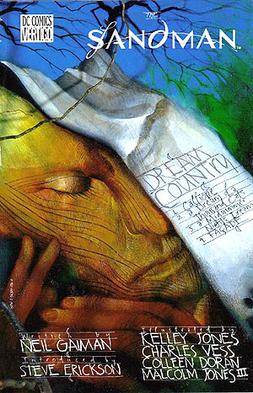
Dream Country is the third trade paperback collection of the comic book series The Sandman, published by DC Comics. It collects issues #17–20. It is written by Neil Gaiman, illustrated by Kelley Jones, Charles Vess, Colleen Doran and Malcolm Jones III, coloured by Robbie Busch and Steve Oliff, and lettered by Todd Klein.
Magic realism or magical realism is a style of literary fiction and art. It paints a realistic view of the world while also adding magical elements, often blurring the lines between fantasy and reality. Magic realism often refers to literature in particular, with magical or supernatural phenomena presented in an otherwise real-world or mundane setting, commonly found in novels and dramatic performances. Despite including certain magic elements, it is generally considered to be a different genre from fantasy because magical realism uses a substantial amount of realistic detail and employs magical elements to make a point about reality, while fantasy stories are often separated from reality. Magical realism is often seen as an amalgamation of real and magical elements that produces a more inclusive writing form than either literary realism or fantasy.

The God of Small Things is a family drama novel written by Indian writer Arundhati Roy. Roy's debut novel, it is a story about the childhood experiences of fraternal twins whose lives are destroyed by the "Love Laws" prevalent in 1960s Kerala, India. The novel explores how small, seemingly insignificant things shape people's behavior and their lives. The novel also explores the lingering effects of casteism in India. It won the Booker Prize in 1997.
Indian literature refers to the literature produced on the Indian subcontinent until 1947 and in the Republic of India thereafter. The Republic of India has 22 officially recognised languages.

Kannada literature is the corpus of written forms of the Kannada language, a member of the Dravidian family spoken mainly in the Indian state of Karnataka and written in the Kannada script.

The Jnanpith Award is the oldest and the highest Indian literary award presented annually by the Bharatiya Jnanpith to an author for their "outstanding contribution towards literature". Instituted in 1961, the award is bestowed only on Indian writers writing in Indian languages included in the Eighth Schedule to the Constitution of India and English, with no posthumous conferral.

Girish Karnad was an Indian actor, film director, Kannada writer, playwright and a Jnanpith awardee, who predominantly worked in South Indian cinema and Bollywood. His rise as a playwright in the 1960s marked the coming of age of modern Indian playwriting in Kannada, just as Badal Sarkar did in Bengali, Vijay Tendulkar in Marathi, and Mohan Rakesh in Hindi. He was a recipient of the 1998 Jnanpith Award, the highest literary honour conferred in India.

Kota Shivaram Karanth, also abbreviated as K. Shivaram Karanth, was an Indian polymath, who was a novelist in Kannada language, playwright and an ecological conservationist. Ramachandra Guha called him the "Rabindranath Tagore of Modern India, who has been one of the finest novelists-activists since independence". He was the third writer to be decorated with the Jnanpith Award for Kannada, the highest literary honor conferred in India. His son Ullas is an ecological conservationist.
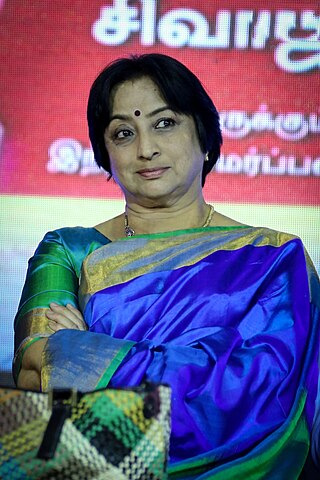
Yaragudipadi Venkata Mahalakshmi, known professionally as Lakshmi, is an Indian actress known for her works primarily in the southern film industry, along with some Hindi films. She made her film debut through a Tamil film Sri Valli in 1961. Her debut as an actress happened with the Tamil film Jeevanaamsam in 1968. In the same year, she also debuted in Kannada and Telugu films with Goa Dalli CID 999 and Bandhavyalu, respectively.

Chandrashekhara Kambara is a prominent Indian poet, playwright, folklorist, film director in Kannada language and the founder-vice-chancellor of Kannada University in Hampi also president of the Sahitya Akademi, country's premier literary institution, after Vinayak Krishna Gokak (1983) and U.R. Ananthamurthy (1993). He is known for effective adaptation of the North Karnataka dialect of the Kannada language in his plays, and poems, in a similar style as in the works of D.R. Bendre.
Modern Kannada literature refers to the body of literature written in the Kannada language, a language spoken mainly in the Indian state of Karnataka. The Kannada script is the writing system used in Kannada literature. In the last forty years, eight modern Kannada authors have been awarded the Jnanpith award, a prestigious private literary award in India. In addition, the Sahitya Akademi Award, the second-highest award for literature granted by the Government of India, has been conferred upon Kannada writers fifty times.
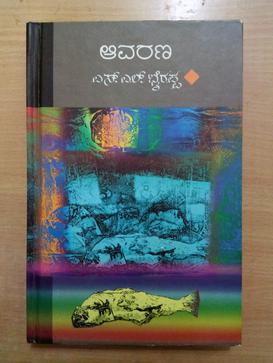
Aavarana is a 2007 Kannada novel by novelist S. L. Bhyrappa. Aavarana means enveloping or covering something. This novel deals with the historical character like Mogul Emperor Aurangazeb. Aavarana was sold out even before its release in February 2007. The novel went on to create a record in the Indian literary world by witnessing 10 reprints within five months of its release.
Magic Ajji is a 2005 Indian Kannada language fantasy film directed by Dinesh Baboo. It was the first digital film shot in high-definition in Kannada, and the second to be released. The first being Baboo's 2004 Kanakambari. Magic Ajji stars Khushbu Sundar as Queen Rajeshwari Devi, the grandmother and ghost, Master Tejas as grandson Arjun, and Sudha Rani as Arjun's mother Nirmala Devi. Other characters are played by Ramesh Bhat, Mandya Ramesh, Chi. Guru Dutt, Chitra Shenoy, Shivaram, Pruthviraj and Karibasavaiah. Ganesh plays a cameo. The movie won critical acclaim for its family entertainment quotient, unprecedented use of special effects and animation, and for the performances on Khushbu and Thejas Kesari.
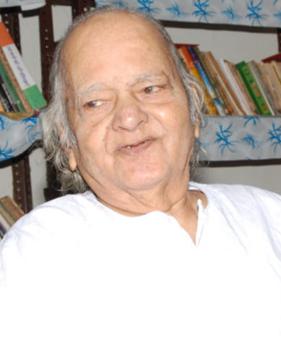
Amarkant was an Indian writer of Hindi literature. His novel Inhin Hathiyaron Se earned him the Sahitya Akademi Award in 2007, and Vyas Samman in year 2009. He was awarded Jnanpith Award for the year 2009. Amarkant is considered one of the prominent writers of the story writing tradition of Premchand but certainly is credited to add something better in that tradition by his own individuality.

Oru Desathinte Katha is a 1971 Malayalam novel written by S. K. Pottekkatt. It portrays the people of Athiranippadam, drawing on history while detailing the story of one place. It won the Kendra Sahitya Academy Award in 1972, and the Jnanpith Award in 1980. The story takes place over a span of about 55 years. It travels from Athiranippadam to North India to Africa and Switzerland.

Aalahayude Penmakkal is a Malayalam novel written by Sarah Joseph and published in 1999. The novel is the first in the trilogy which includes 'Mattathi' and 'Othappu'. This novel gave widespread recognition to Sarah Joseph and her craft. 'Aalahayude Penmakkal' won the Kerala Sahitya Academy award of 2001, Kendra Sahitya Academy award of 2003, Vayalar Ramavarma award of 2004, and Cherukad Award of 2000. The novel deals with the condition of marginalized groups in society pointed out as subalterns by Marxist Antonio Gramsci. The living and existential conditions of these groups are seldom acknowledged by the society at large and generally they are displaced from their places of stay and livelihoods, usually in the name of development and change. This transformation in their existential struggle is narrated by Annie, the central character, who gives voice to three generations of her subaltern group albeit with a feminine perspective.
Imayam is an Indian Tamil-language novelist from Chennai, Tamil Nadu, He has seven novels, seven short story collections and a novella to his credit. He is closely associated with the Dravidian Movement and its politics and considered as one of the leading writers from South India. He is the recipient of the honorary Sahitya Akademi Award for his novel Selladha Panam in 2020. He is also the first Tamil writer to receive the Kuvempu Rashtriya Puraskar National Award (2022) for bringing new sensibilites to Tamil literature through his writings. Noting the writer's proclivity to Dravidian ideals, the Tamil Nadu chief minister M.K.Stalin called him "an ideologue donned in black and red". He lauded Imayam calling him a "proactive writer" in the Dravidian movement.
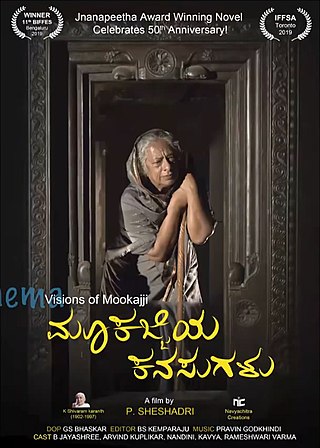
Mookajjiya Kanasugalu is a 2019 Kannada film directed by P. Sheshadri, based on the Jnanpith Award-winning novel of the same name by K. Shivaram Karanth. The film was produced by Navyachitra Creations and written by P. Sheshadri.
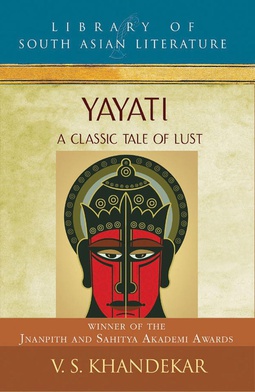
Yayati is a 1959 Marathi-language mythological novel by Indian writer V. S. Khandekar. One of Khandekar's best-known works, it retells the story of the mythical Hindu king, Yayati, from the Hindu epic the Mahabharata. The novel has multiple narrators, and poses several questions on the nature of morality. Scholars have analysed its hero, Yayati, as a representation of modern man. Accepted as classic of Marathi literature, Yayati has won several awards, including the Sahitya Akademi Award in 1960 and the Jnanapith Award in 1974.
The Shivarama Karantha Balavana is notable for its fame under the name of Jnanapeeta awardee Kota Shivarama Karanthar, who lived in Puttur. His home now houses a museum, a park, and a recreation center. This a multi-purpose tourist attraction, at Puttur, south part of Mangalore city in Karnataka, under trust managed District Administration of Dakshina Kannada and Kannada And Culture Department of Karntaka Government. It is a major tourist attraction of Puttur. It attracts large number of tourists due to the availability of multiple facilities.














